关于英语语言的变化
分析英语语言的变化与趋势
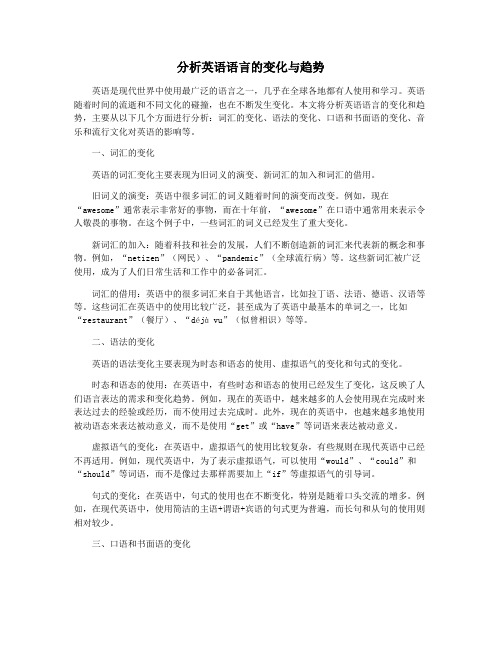
分析英语语言的变化与趋势英语是现代世界中使用最广泛的语言之一,几乎在全球各地都有人使用和学习。
英语随着时间的流逝和不同文化的碰撞,也在不断发生变化。
本文将分析英语语言的变化和趋势,主要从以下几个方面进行分析:词汇的变化、语法的变化、口语和书面语的变化、音乐和流行文化对英语的影响等。
一、词汇的变化英语的词汇变化主要表现为旧词义的演变、新词汇的加入和词汇的借用。
旧词义的演变:英语中很多词汇的词义随着时间的演变而改变。
例如,现在“awesome”通常表示非常好的事物,而在十年前,“awesome”在口语中通常用来表示令人敬畏的事物。
在这个例子中,一些词汇的词义已经发生了重大变化。
新词汇的加入:随着科技和社会的发展,人们不断创造新的词汇来代表新的概念和事物。
例如,“netizen”(网民)、“pandemic”(全球流行病)等。
这些新词汇被广泛使用,成为了人们日常生活和工作中的必备词汇。
词汇的借用:英语中的很多词汇来自于其他语言,比如拉丁语、法语、德语、汉语等等。
这些词汇在英语中的使用比较广泛,甚至成为了英语中最基本的单词之一,比如“restaurant”(餐厅)、“déjà vu”(似曾相识)等等。
二、语法的变化英语的语法变化主要表现为时态和语态的使用、虚拟语气的变化和句式的变化。
时态和语态的使用:在英语中,有些时态和语态的使用已经发生了变化,这反映了人们语言表达的需求和变化趋势。
例如,现在的英语中,越来越多的人会使用现在完成时来表达过去的经验或经历,而不使用过去完成时。
此外,现在的英语中,也越来越多地使用被动语态来表达被动意义,而不是使用“get”或“have”等词语来表达被动意义。
虚拟语气的变化:在英语中,虚拟语气的使用比较复杂,有些规则在现代英语中已经不再适用。
例如,现代英语中,为了表示虚拟语气,可以使用“would”、“could”和“should”等词语,而不是像过去那样需要加上“if”等虚拟语气的引导词。
英语语言发展史
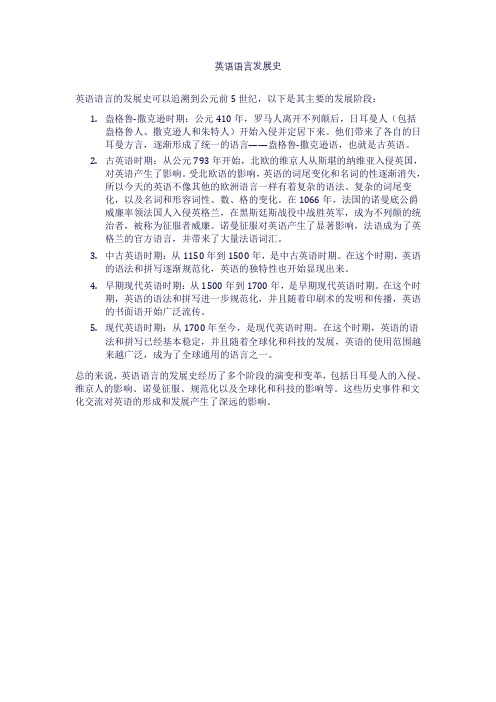
英语语言发展史英语语言的发展史可以追溯到公元前5世纪,以下是其主要的发展阶段:1.盎格鲁-撒克逊时期:公元410年,罗马人离开不列颠后,日耳曼人(包括盎格鲁人、撒克逊人和朱特人)开始入侵并定居下来。
他们带来了各自的日耳曼方言,逐渐形成了统一的语言——盎格鲁-撒克逊语,也就是古英语。
2.古英语时期:从公元793年开始,北欧的维京人从斯堪的纳维亚入侵英国,对英语产生了影响。
受北欧语的影响,英语的词尾变化和名词的性逐渐消失,所以今天的英语不像其他的欧洲语言一样有着复杂的语法、复杂的词尾变化,以及名词和形容词性、数、格的变化。
在1066年,法国的诺曼底公爵威廉率领法国人入侵英格兰,在黑斯廷斯战役中战胜英军,成为不列颠的统治者,被称为征服者威廉。
诺曼征服对英语产生了显著影响,法语成为了英格兰的官方语言,并带来了大量法语词汇。
3.中古英语时期:从1150年到1500年,是中古英语时期。
在这个时期,英语的语法和拼写逐渐规范化,英语的独特性也开始显现出来。
4.早期现代英语时期:从1500年到1700年,是早期现代英语时期。
在这个时期,英语的语法和拼写进一步规范化,并且随着印刷术的发明和传播,英语的书面语开始广泛流传。
5.现代英语时期:从1700年至今,是现代英语时期。
在这个时期,英语的语法和拼写已经基本稳定,并且随着全球化和科技的发展,英语的使用范围越来越广泛,成为了全球通用的语言之一。
总的来说,英语语言的发展史经历了多个阶段的演变和变革,包括日耳曼人的入侵、维京人的影响、诺曼征服、规范化以及全球化和科技的影响等。
这些历史事件和文化交流对英语的形成和发展产生了深远的影响。
分析英语语言的变化与趋势

分析英语语言的变化与趋势英语是世界上使用最广泛的语言之一,在全球范围内有超过20亿人口使用英语进行日常交流。
英语已经成为国际商务、学术交流、文化传播等领域的主要语言。
英语的发展史可以追溯到中古英语时期,经历了多个历史时期,形成了不同的方言和变体,如美国英语、英国英语、澳大利亚英语等。
当前,英语的变化与趋势主要集中在以下几个方面。
一、全球性的英语语言学习热潮随着全球化的深入发展,人们对英语的需求越来越高,英语成为世界上最需要学习的语言之一。
促进这一学习热潮的原因是多方面的。
首先,英语成为一种重要的交际工具,能够加速国际交流与合作。
其次,英语的使用范围广泛,包含了科技、商务、文化、教育等众多领域。
这一趋势又带动了英语培训机构和学习资源的迅速扩展,并且开辟了新的教学形式,如网络学习和在线课程等。
二、英语全球化的影响随着英语全球化的推动,英语文化和语言发挥着越来越大的影响力,传递着包括音乐、电影、文学、时尚在内的各种文化形式。
这些文化形式对传统文化产生了深远的影响,并对英语词汇和语法结构的发展产生了巨大的影响。
这些影响使得英语的词汇资源更加丰富多样。
四、科技的革新对英语的影响随着科技的飞速发展,英语正在迅速适应数字时代的需求。
在这个伴随科技革新的过程中,许多英文术语涌现出来,如“APP”、“IP”的缩写等。
同时,随着人工智能技术的不断成熟,语音识别和自然语言处理技术也在不断提升,为英语语言的发展和使用提供了更多的可能性和空间。
总之,英语的变化和趋势是不断的,伴随全球化推进、科技革新加速,英语将继续演化并扩散到全球各个角落,成为全球交流合作的桥梁。
英语语言的发展历史
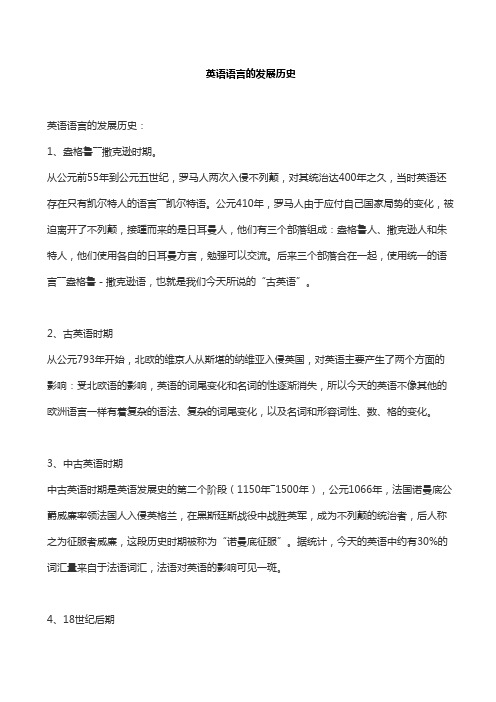
英语语言的发展历史英语语言的发展历史:1、盎格鲁――撒克逊时期。
从公元前55年到公元五世纪,罗马人两次入侵不列颠,对其统治达400年之久,当时英语还存在只有凯尔特人的语言――凯尔特语。
公元410年,罗马人由于应付自己国家局势的变化,被迫离开了不列颠,接踵而来的是日耳曼人,他们有三个部落组成:盎格鲁人、撒克逊人和朱特人,他们使用各自的日耳曼方言,勉强可以交流。
后来三个部落合在一起,使用统一的语言――盎格鲁-撒克逊语,也就是我们今天所说的“古英语”。
2、古英语时期从公元793年开始,北欧的维京人从斯堪的纳维亚入侵英国,对英语主要产生了两个方面的影响:受北欧语的影响,英语的词尾变化和名词的性逐渐消失,所以今天的英语不像其他的欧洲语言一样有着复杂的语法、复杂的词尾变化,以及名词和形容词性、数、格的变化。
3、中古英语时期中古英语时期是英语发展史的第二个阶段(1150年―1500年),公元1066年,法国诺曼底公爵威廉率领法国人入侵英格兰,在黑斯廷斯战役中战胜英军,成为不列颠的统治者,后人称之为征服者威廉,这段历史时期被称为“诺曼底征服”。
据统计,今天的英语中约有30%的词汇量来自于法语词汇,法语对英语的影响可见一斑。
4、18世纪后期英国已通过其殖民地和地缘政治统治地位传播了英语。
商业、科学技术、外交、艺术和正规教育都使英语成为第一种真正的全球语言。
英语还促进了世界范围的国际交流。
英格兰继续形成新的殖民地,后来这些殖民地发展了自己的言语和写作规范。
5、现代语法情况的丧失几乎是完整的,而SVO的字序大部分是固定的。
一些更改,例如使用do-support已变得普遍。
在-ing中使用渐进形式似乎正在传播到新的建筑,并且已经建造的形式变得越来越普遍。
不规则形式的正则化也缓慢地继续,并且变形形式的分析替代方法变得越来越普遍。
受美式英语在媒体中的强大影响以及与美国作为世界大国相关的声望,英式英语也在美式英语的影响下也在发生变化。
分析英语语言的变化与趋势

分析英语语言的变化与趋势
英语作为全球使用最广泛的语言之一,不断地在不同地区和不同文化背景下发生变化和演变。
以下是对英语语言变化与趋势的分析:
1. 词汇的变化:英语词汇是不断发展和更新的,新词汇的产生与科技和社会文化的进步密切相关。
随着科技的不断发展,新词如“internet”(互联网)、“smartphone”(智能手机)等相继出现在英语中。
由于不同文化之间的交流增加,外来词汇也在不断涌入英语中,如“sushi”(寿司)和“kimono”(和服)等。
2. 句法结构的变化:英语的句法结构变化不大,但随着时间的推移,一些句法规则逐渐趋于宽松。
传统上,英语中的主谓宾结构是较为常见的句法结构,但现代英语中越来越多的人开始使用主谓状结构,如“她走进房间,大喊一声”。
3. 语音与发音的变化:英语的语音和发音也会随着时间的推移发生变化。
现代英语中的发音与古英语和中古英语时期相比,发生了许多变化。
由于全球化的影响,不同地区和文化背景下的英语使用者存在着不同的口音和发音习惯。
英国英语和美国英语的发音差异较大。
4. 语气与语调的变化:随着社会的变迁,英语的语气和语调也发生了一些变化。
现代英语中,表达态度的方式变得更直接和明确。
如今,年轻人使用的语言更加口语化和随性化,表达出更多的情感和个性。
而老一辈使用的语言往往更加正式和客观。
5. 议论和表达的变化:在互联网的普及和社交媒体的兴起的背景下,英语的使用方式也发生了变化。
社交媒体上的有限字数限制和表情符号的广泛使用导致英语表达更加简洁和简明。
人们更倾向于使用缩写词和俚语进行交流,以快速传达信息。
关于英语语言进化的英语作文

关于英语语言进化的英语作文The English language, a tapestry woven from the threads of history, has evolved into a global lingua franca that defies the boundaries of culture and geography. From its humble beginnings as a Germanic tongue to its current status as a melting pot of influences, English has undergone a fascinating transformation that reflects the ever-changing world it represents.The journey of English began with the arrival of the Anglo-Saxons in Britain, where Old English was born. Over centuries, it absorbed elements from Latin, French, and other languages, particularly during the Norman Conquest. This period marked the birth of Middle English, which saw the language's vocabulary expand and its grammar evolve.The Renaissance and the Age of Exploration further enriched English, as it came into contact with new cultures and languages. Words from Latin, Greek, and other European languages were integrated, creating a more diverse and expressive language. The invention of the printing press by Johannes Gutenberg in the 15th century played a pivotal role in standardizing English spelling and grammar, making it accessible to a wider audience.The 18th and 19th centuries witnessed the emergence of Modern English, with the language spreading across the globe through colonization and trade. The British Empire's reachensured that English became the common language in many parts of the world, from India to Australia, and the United Statesto Africa.In the 20th century, English solidified its position asthe language of international communication, business, and diplomacy. The rise of the United States as a global superpower further cemented English's role, and the advent of the internet and social media has only accelerated its spread.Today, English is a living, breathing language that continues to evolve. New words are coined, and old ones are repurposed to meet the needs of a rapidly changing world.From tech jargon like "app" and "blog" to the playfuladoption of emojis and internet slang, English is a testament to the human capacity for innovation and expression.The future of English is as unpredictable as it is exciting. It will undoubtedly continue to adapt andincorporate elements from other languages and cultures, reflecting the global community it serves. As we embrace this dynamic language, we also embrace the myriad of voices and perspectives that make English the vibrant, ever-evolving language it is today.。
英语的起源发展和演变

英语的起源发展和演变1. 古英语时期(4501066年)古英语是英语的早期形式,其词汇、语法和发音与现代英语相比有很大差异。
这一时期的英语受到拉丁语和古诺斯语的影响,词汇量相对有限。
古英语时期的文学作品包括《贝奥武甫》等史诗,这些作品为后世研究古英语提供了宝贵的资料。
2. 中古英语时期(10661500年)1066年,诺曼征服英格兰后,法语成为英国上层社会的官方语言,而英语逐渐沦为民间语言。
然而,英语并未因此消失,而是在不断吸收法语、拉丁语等词汇的基础上,逐渐发展壮大。
这一时期的英语,语法和词汇都发生了较大变化,为现代英语的形成奠定了基础。
3. 现代英语早期(15001700年)15世纪末,英国成为世界强国,英语的地位逐渐上升。
这一时期,英语大量吸收了拉丁语、希腊语、法语等词汇,词汇量迅速扩大。
随着印刷术的传入,英语标准化进程加快,语法和拼写逐渐规范。
莎士比亚等文学巨匠的作品,更是将英语推向一个新的高度。
4. 现代英语时期(1700年至今)18世纪以来,英国在全球范围内的殖民地扩张,使得英语成为世界范围内的通用语言。
现代英语在词汇、语法和发音等方面继续发展,形成了多种英语变体,如美式英语、英式英语、澳大利亚英语等。
这些变体虽有差异,但基本语法结构相同,沟通无障碍。
英语的起源、发展和演变历程见证了人类文明的发展。
如今,英语已成为国际交流的重要工具,其在全球范围内的地位日益巩固。
了解英语的起源和发展,有助于我们更好地学习这门语言,增进国际间的沟通与理解。
5. 语言的融合与创新英语的演变并非孤立进行,它不断地吸收其他语言的精华,实现自我更新。
在18世纪至20世纪,随着全球贸易、科技和文化的交流,英语词汇库得到了极大的丰富。
例如,从印度语中借来了“瑜伽”、“丛林”等词汇,从阿拉伯语中借来了“咖啡”、“算法”等。
这种语言的融合不仅丰富了英语的表达,也体现了人类文化的交流与共生。
6. 语法结构的简化随着时间的推移,英语的语法结构逐渐简化。
分析英语语言的变化与趋势

分析英语语言的变化与趋势英语是世界上最常用的第二语言,随着全球化的进程和英语作为国际交流的主要工具,它不断地发展和变化。
英语的变化和趋势主要体现在以下几个方面:1. 声音变化:英语的发音一直在变化。
随着时间的推移,语音系统中的某些音素会发生变化,例如Great Vowel Shift(大母音变化)和rhotic与non-rhotic变体的出现。
英语的口语发音也受到不同方言和地区口音的影响。
2. 词汇增长:全球化和科技进步的影响下,英语词汇在不断增长。
每年都会有大量新词汇被添加到英语词典中,这些新词汇主要来自科技领域、社交媒体和流行文化。
3. 语法简化:随着时间的推移,英语的语法变得更加简化。
英语的屈折变化减少,语序变得更加固定,例如动词的变化规则减少,人称代词的使用减少等。
这使得英语更容易学习和使用。
4. 国际化:作为国际交流的主要语言之一,英语正变得更加国际化。
这意味着英语正在受到来自不同语言和文化的影响,以及其他语言的外来词汇的借用。
这种国际化倾向也反映在英语的教学和学习中,越来越多的人学习英语作为第二语言。
5. 科技影响:随着科技的快速发展,英语也受到科技的影响。
科技术语和新兴的网络用语不断出现,例如“app”(应用程序)、“selfie”(自拍)等。
科技也改变了英语的传播和学习方式,例如在线学习、远程教育和语音识别技术等。
英语作为国际语言不断演变和发展。
语音、词汇、语法和语用等方面都在发生变化。
这些变化和趋势使得英语更加易于学习和使用,并适应了全球化和科技发展的需求。
不仅英语在英语国家内发展,它也在国际舞台上继续扩大其影响力。
了解和适应这些变化和趋势对于学好英语和与世界各地的人进行有效的交流至关重要。
分析英语语言的变化与趋势
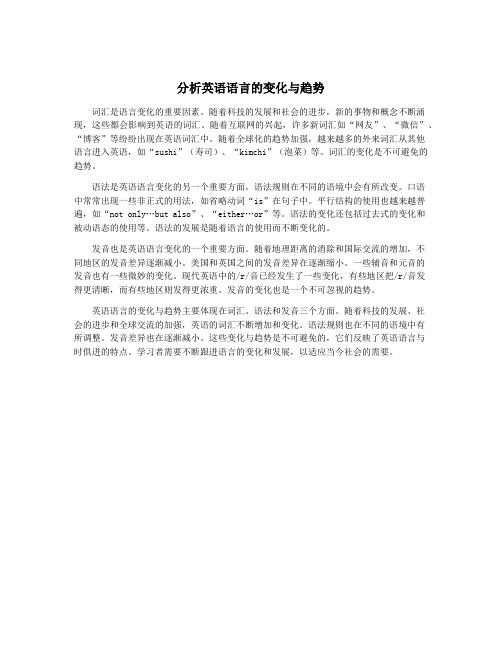
分析英语语言的变化与趋势词汇是语言变化的重要因素。
随着科技的发展和社会的进步,新的事物和概念不断涌现,这些都会影响到英语的词汇。
随着互联网的兴起,许多新词汇如“网友”、“微信”、“博客”等纷纷出现在英语词汇中。
随着全球化的趋势加强,越来越多的外来词汇从其他语言进入英语,如“sushi”(寿司)、“kimchi”(泡菜)等。
词汇的变化是不可避免的趋势。
语法是英语语言变化的另一个重要方面。
语法规则在不同的语境中会有所改变。
口语中常常出现一些非正式的用法,如省略动词“is”在句子中。
平行结构的使用也越来越普遍,如“not only…but also”、“either…or”等。
语法的变化还包括过去式的变化和被动语态的使用等。
语法的发展是随着语言的使用而不断变化的。
发音也是英语语言变化的一个重要方面。
随着地理距离的消除和国际交流的增加,不同地区的发音差异逐渐减小。
美国和英国之间的发音差异在逐渐缩小。
一些辅音和元音的发音也有一些微妙的变化。
现代英语中的/r/音已经发生了一些变化,有些地区把/r/音发得更清晰,而有些地区则发得更浓重。
发音的变化也是一个不可忽视的趋势。
英语语言的变化与趋势主要体现在词汇、语法和发音三个方面。
随着科技的发展、社会的进步和全球交流的加强,英语的词汇不断增加和变化。
语法规则也在不同的语境中有所调整。
发音差异也在逐渐减小。
这些变化与趋势是不可避免的,它们反映了英语语言与时俱进的特点。
学习者需要不断跟进语言的变化和发展,以适应当今社会的需要。
分析英语语言的变化与趋势
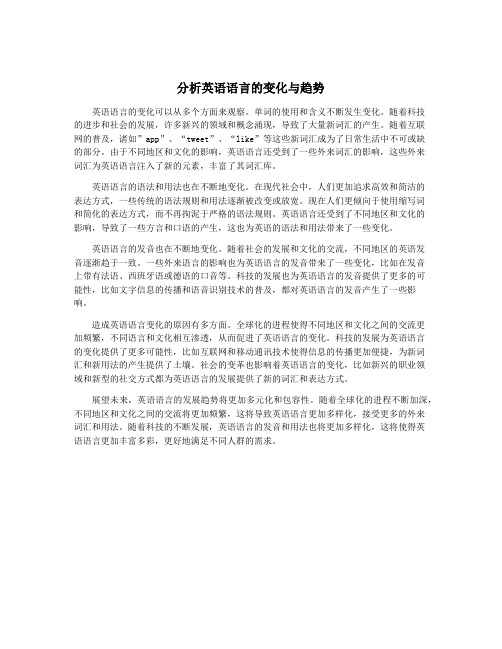
分析英语语言的变化与趋势英语语言的变化可以从多个方面来观察。
单词的使用和含义不断发生变化。
随着科技的进步和社会的发展,许多新兴的领域和概念涌现,导致了大量新词汇的产生。
随着互联网的普及,诸如”app”、“tweet”、“like”等这些新词汇成为了日常生活中不可或缺的部分。
由于不同地区和文化的影响,英语语言还受到了一些外来词汇的影响,这些外来词汇为英语语言注入了新的元素,丰富了其词汇库。
英语语言的语法和用法也在不断地变化。
在现代社会中,人们更加追求高效和简洁的表达方式,一些传统的语法规则和用法逐渐被改变或放宽。
现在人们更倾向于使用缩写词和简化的表达方式,而不再拘泥于严格的语法规则。
英语语言还受到了不同地区和文化的影响,导致了一些方言和口语的产生,这也为英语的语法和用法带来了一些变化。
英语语言的发音也在不断地变化。
随着社会的发展和文化的交流,不同地区的英语发音逐渐趋于一致。
一些外来语言的影响也为英语语言的发音带来了一些变化,比如在发音上带有法语、西班牙语或德语的口音等。
科技的发展也为英语语言的发音提供了更多的可能性,比如文字信息的传播和语音识别技术的普及,都对英语语言的发音产生了一些影响。
造成英语语言变化的原因有多方面。
全球化的进程使得不同地区和文化之间的交流更加频繁,不同语言和文化相互渗透,从而促进了英语语言的变化。
科技的发展为英语语言的变化提供了更多可能性,比如互联网和移动通讯技术使得信息的传播更加便捷,为新词汇和新用法的产生提供了土壤。
社会的变革也影响着英语语言的变化,比如新兴的职业领域和新型的社交方式都为英语语言的发展提供了新的词汇和表达方式。
展望未来,英语语言的发展趋势将更加多元化和包容性。
随着全球化的进程不断加深,不同地区和文化之间的交流将更加频繁,这将导致英语语言更加多样化,接受更多的外来词汇和用法。
随着科技的不断发展,英语语言的发音和用法也将更加多样化,这将使得英语语言更加丰富多彩,更好地满足不同人群的需求。
分析英语语言的变化与趋势

分析英语语言的变化与趋势1. 引言1.1 了解英语语言的演变历史英语这门语言的演变历史可以追溯到公元5世纪,当时那个时代的英语并不是今天我们所熟知的样子。
在经历了多次外来语言和文化的影响后,英语逐渐形成并发展壮大。
最初的英语是由日耳曼部落所说的一种语言,后来受到了拉丁语、法语、维京语等多种语言的影响,逐渐形成了现代英语的基础。
在中世纪时期,英语开始在书面作品中出现,并逐渐取代了拉丁语成为英格兰的主要语言。
随着文艺复兴和启蒙时代的到来,英语逐渐成为一门重要的国际语言。
在现代,英语已经成为全球通用的工作和学习语言,影响着世界上的各个领域。
通过了解英语语言的演变历史,我们可以更好地理解英语今天的形态和特点,也可以更好地预测未来英语语言的发展趋势。
【字数:200】1.2 探讨英语语言的变化原因英语语言的变化是受多方面因素影响的。
全球化、科技发展、社会文化变迁、新词汇的出现以及语法发音的变化都在不断地塑造着英语这门语言。
在未来,随着全球化的深入和科技的不断发展,英语语言可能会继续演变,适应新的社会和文化需求。
我们应当保持对英语语言的关注,不断学习和适应这门不断变化的语言,以更好地适应全球化的环境和多样化的交流需求。
2. 正文2.1 全球化对英语语言的影响Globalization has had a significant impact on the English language, leading to changes in vocabulary, grammar, and pronunciation. As English has become the lingua franca of the business world, international politics, and popular culture, it has absorbed words and phrases from various languages and dialects around the world.2.2 科技对英语语言的影响科技对英语语言的影响可以说是深远而广泛的。
分析英语语言的变化与趋势
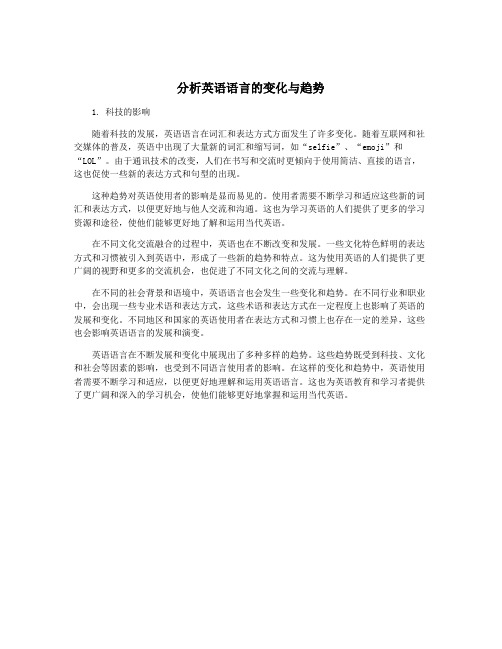
分析英语语言的变化与趋势
1. 科技的影响
随着科技的发展,英语语言在词汇和表达方式方面发生了许多变化。
随着互联网和社交媒体的普及,英语中出现了大量新的词汇和缩写词,如“selfie”、“emoji”和“LOL”。
由于通讯技术的改变,人们在书写和交流时更倾向于使用简洁、直接的语言,这也促使一些新的表达方式和句型的出现。
这种趋势对英语使用者的影响是显而易见的。
使用者需要不断学习和适应这些新的词汇和表达方式,以便更好地与他人交流和沟通。
这也为学习英语的人们提供了更多的学习资源和途径,使他们能够更好地了解和运用当代英语。
在不同文化交流融合的过程中,英语也在不断改变和发展。
一些文化特色鲜明的表达方式和习惯被引入到英语中,形成了一些新的趋势和特点。
这为使用英语的人们提供了更广阔的视野和更多的交流机会,也促进了不同文化之间的交流与理解。
在不同的社会背景和语境中,英语语言也会发生一些变化和趋势。
在不同行业和职业中,会出现一些专业术语和表达方式,这些术语和表达方式在一定程度上也影响了英语的发展和变化。
不同地区和国家的英语使用者在表达方式和习惯上也存在一定的差异,这些也会影响英语语言的发展和演变。
英语语言在不断发展和变化中展现出了多种多样的趋势。
这些趋势既受到科技、文化和社会等因素的影响,也受到不同语言使用者的影响。
在这样的变化和趋势中,英语使用者需要不断学习和适应,以便更好地理解和运用英语语言。
这也为英语教育和学习者提供了更广阔和深入的学习机会,使他们能够更好地掌握和运用当代英语。
英语语言变化中的社会因素

英语语言变化中的社会因素语言,作为人类交流和表达思想的工具,并非是一成不变的。
英语,这一在全球范围内广泛使用的语言,其发展历程中充满了变化。
而这些变化,在很大程度上受到了社会因素的影响。
社会的变迁是推动英语语言变化的重要力量。
工业革命带来了巨大的社会变革,新的技术、新的生产方式和新的职业不断涌现。
例如,“steam engine”(蒸汽机)、“factory”(工厂)、“mechanic”(机械师)等词汇应运而生。
随着科技的飞速发展,现代社会中的计算机、互联网相关词汇如“software”(软件)、“hardware”(硬件)、“website”(网站)等逐渐成为了英语中的常用词汇。
社会的进步促使人们需要新的词汇来描述新的事物和现象,从而推动了英语词汇的不断丰富和更新。
经济因素在英语语言的变化中也发挥着关键作用。
国际贸易的发展使得英语成为了商务交流的重要语言。
为了适应全球经济交流的需求,商务英语逐渐形成了一套独特的词汇和表达方法。
例如,“import”(进口)、“export”(出口)、“stock market”(股票市场)等词汇在商务领域中被广泛使用。
经济的繁荣或衰退也会影响语言的使用。
在经济繁荣时期,可能会出现更多积极、乐观的词汇和表达方式;而在经济衰退时期,语言中可能会更多地体现出担忧、焦虑等情绪。
文化的交流与融合对英语语言的变化产生了深远影响。
全球化的进程使得不同国家和民族的文化相互碰撞和融合。
英语吸收了来自世界各地语言的词汇和表达方式。
比如,来自法语的“rendezvous”(约会)、来自日语的“karaoke”(卡拉 OK)、来自中文的“kung fu”(功夫)等。
这种文化的融合不仅丰富了英语的词汇,也使得英语的表达方式更加多样化。
政治因素同样在英语语言的变化中留下了深刻的印记。
战争、政治变革等重大政治事件往往会带来新的词汇和表达方式。
例如,两次世界大战期间,出现了“blitzkrieg”(闪电战)、“atomic bomb”(原子弹)等与战争相关的词汇。
分析英语语言的变化与趋势

分析英语语言的变化与趋势
首先,单词的使用是英语语言中最明显的变化之一。
当今的英语比以前更多地使用简化、缩短和新创单词。
比如,"text" (短信)、"blog" (博客)、"selfie" (自拍) 和"emoji" (表情符号)等新词汇不断涌现,这些新词汇代表了当今社会快速发展的文化和技术。
其次,英语语法也在不断变化。
随着英语的国际化和使用范围的扩大,文法规则更加
灵活。
例如,现在的英语通常接受断句和残缺语法来更好地传达思想,而这些方法在以前
可能被认为不符合语法规则。
第三,英语语言的词汇也在不断变化。
除了新创词汇外,很多旧词汇的用法也在改变。
例如,一些形容动物的词汇已经不再使用了,比如"coyote" (郊狼)被用来形容邪恶和危险,而现在则被广泛使用来形容动物。
最后,英语语言中文化背景的影响也在不断变化。
随着世界的发展和文化的交流,英
语语言中的文化元素也在不断变化。
例如,美国的流行文化,如电影、电视节目和音乐,
已经成为使用英语的人们之间的共通语言。
英语语言形式改变的原因分析

英语语言形式改变的原因分析英语作为世界上使用最广泛的语言之一,其语言形式一直在不断地发生变化。
这些变化可能涉及单词的拼写、语法结构、发音方式以及词汇的增减等方面。
那么,英语语言形式改变的原因是什么呢?本文将就此问题展开分析。
1. 社会变化随着社会的不断发展和进步,人们的生活方式、价值观念和文化传统也在发生着变化,这必然会反映在语言中。
英语的语言形式变化与社会变化密切相关。
随着科技的飞速发展,新的科学名词、技术术语等不断出现,这就需要英语语言形式的不断更新和改变。
社会的多元化也导致了英语的语言形式变得更加多样化和丰富化。
随着移民的不断涌入,英语中不断涌现出来自不同文化背景的词汇和表达方式,这些都是英语语言形式变化的原因之一。
2. 文化交流随着全球化的进程不断加快,不同国家和地区之间的文化交流也越来越频繁。
这种文化交流不仅带来了语言形式的互相借鉴,还促进了英语语言形式的多样化和丰富化。
随着中西文化交流的不断深入,许多汉语词汇和表达方式也被引入到英语中,这就推动了英语语言形式的改变。
同样,英语也在不断影响着其他语言的形式,这种相互影响和借鉴促进了英语语言形式的不断变化。
3. 语言演变任何一种语言都是在不断演变和发展的。
英语语言形式的变化也是一种自然的语言演变过程。
古英语与现代英语相比,其语音、词汇、语法结构等方面都发生了巨大的变化。
这种语言演变的原因有很多,比如人口迁徙、文化交流、历史变迁等。
而在当今社会,语言形式的变化更多的是受到科技和信息技术的影响。
随着互联网的普及和移动通讯技术的发展,英语语言形式变得更加简洁、直接、简易,这就导致了一些传统的语言形式逐渐被取代。
4. 教育和媒体的影响教育和媒体在塑造语言形式方面发挥着重要的作用。
学校教育和大众传媒对语言形式的规范和标准起着至关重要的作用。
随着教育水平的不断提高和传媒的普及,人们对语言形式的标准和规范也变得更加重视。
这就要求语言形式需要不断更新和改变,以适应当代社会的需要。
分析英语语言的变化与趋势

分析英语语言的变化与趋势英语语言是一门在全球范围内广泛使用的语言,它在不同国家和地区都有着不同的变化和趋势。
本文将从词汇、语法和语音等方面分析英语语言的变化与趋势。
一、词汇变化与趋势1.借词:随着全球化的进程,英语语言中不断涌现了来自其他语言的借词。
“sushi”来自日语,“kimchi”来自韩语,“taco”来自西班牙语等等。
这些借词丰富了英语的词汇,也反映了不同文化的交流与融合。
2.新创词:随着科学技术的发展和社会进步,英语语言中不断出现新创词。
“internet”、“smartphone”、“selfie”等词汇在近几十年中迅速流行起来,成为日常生活中不可或缺的词汇。
3.俚语与流行语:俚语和流行语是英语中变化最快的一部分。
它们通常来源于年轻人群体的创造和使用,随着时间的推移逐渐进入主流语言。
“LOL”、“YOLO”、“FOMO”等词汇迅速在社交媒体和年轻人之间传播。
1.简化:随着时间的推移,英语语法逐渐简化。
动词的时态变化变得简化,人们更倾向于使用一般现在时表达过去、现在和将来的意思。
由于语言的快速发展和变化,人们更倾向于使用简短的句子和短语表达思想。
2.非谓语动词:在现代英语中,非谓语动词的使用逐渐增多。
“doing”、“have done”、“to do”等非谓语动词结构在口语和写作中使用广泛,使句子结构更加灵活。
3.助动词的变化:随着时间的推移,助动词的使用逐渐减少。
在现代英语中,“do”和“did”等助动词在疑问句和否定句中的使用频率较高。
1.辅音变化:英语语音中的辅音不断变化。
在某些方言中,“th”音逐渐变成“f”音,将“thing”发音为“fing”;在某些方言中,/r/音发音变得更多样化,将“car”发音为“cah”。
3.重音变化:英语语音中的重音也有一些变化。
在某些方言中,重音逐渐向句首或句中移动,将“address”的重音从第二个音节移到了第一个音节,发音为“ə'drɛs”。
分析英语语言的变化与趋势
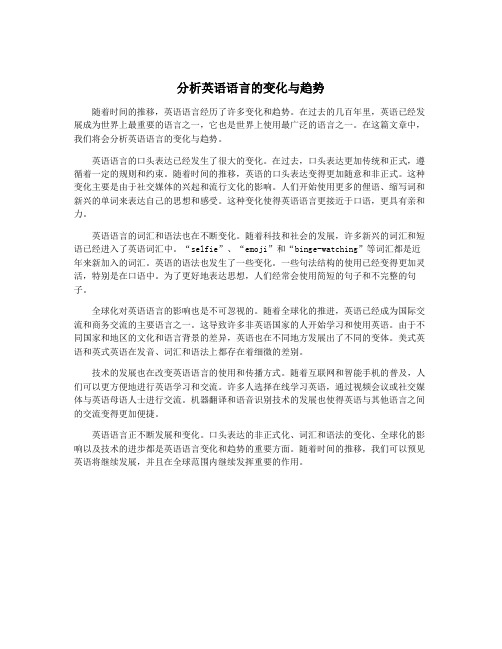
分析英语语言的变化与趋势随着时间的推移,英语语言经历了许多变化和趋势。
在过去的几百年里,英语已经发展成为世界上最重要的语言之一,它也是世界上使用最广泛的语言之一。
在这篇文章中,我们将会分析英语语言的变化与趋势。
英语语言的口头表达已经发生了很大的变化。
在过去,口头表达更加传统和正式,遵循着一定的规则和约束。
随着时间的推移,英语的口头表达变得更加随意和非正式。
这种变化主要是由于社交媒体的兴起和流行文化的影响。
人们开始使用更多的俚语、缩写词和新兴的单词来表达自己的思想和感受。
这种变化使得英语语言更接近于口语,更具有亲和力。
英语语言的词汇和语法也在不断变化。
随着科技和社会的发展,许多新兴的词汇和短语已经进入了英语词汇中。
“selfie”、“emoji”和“binge-watching”等词汇都是近年来新加入的词汇。
英语的语法也发生了一些变化。
一些句法结构的使用已经变得更加灵活,特别是在口语中。
为了更好地表达思想,人们经常会使用简短的句子和不完整的句子。
全球化对英语语言的影响也是不可忽视的。
随着全球化的推进,英语已经成为国际交流和商务交流的主要语言之一。
这导致许多非英语国家的人开始学习和使用英语。
由于不同国家和地区的文化和语言背景的差异,英语也在不同地方发展出了不同的变体。
美式英语和英式英语在发音、词汇和语法上都存在着细微的差别。
技术的发展也在改变英语语言的使用和传播方式。
随着互联网和智能手机的普及,人们可以更方便地进行英语学习和交流。
许多人选择在线学习英语,通过视频会议或社交媒体与英语母语人士进行交流。
机器翻译和语音识别技术的发展也使得英语与其他语言之间的交流变得更加便捷。
英语语言正不断发展和变化。
口头表达的非正式化、词汇和语法的变化、全球化的影响以及技术的进步都是英语语言变化和趋势的重要方面。
随着时间的推移,我们可以预见英语将继续发展,并且在全球范围内继续发挥重要的作用。
现代英语的特点

现代英语的特点现代英语的特点是一种相对于古代英语而言的语言形式,它在语音、词汇、语法和用法等方面都有所改变和发展。
现代英语的特点可以从以下几个方面来解释:1. 语音变化:现代英语相对于古代英语来说,发生了很多语音变化。
例如,元音的发音变得更加简化和短暂,辅音的发音也有所调整。
此外,现代英语中的连读现象也比古代英语更加普遍。
2. 词汇丰富:现代英语相对于古代英语来说,词汇量大大增加。
随着科技、社会和文化的发展,新的词汇不断涌现。
现代英语中的词汇丰富多样,可以表达更加准确和具体的意思。
3. 语法简化:现代英语相对于古代英语来说,语法结构更加简化。
古代英语中有复杂的屈折变化和语法规则,而现代英语中很多屈折变化已经消失或简化。
现代英语的语法结构更加简洁明了,容易理解和使用。
4. 影响因素:现代英语受到了其他语言的影响。
随着英国的殖民扩张和全球化的发展,现代英语吸收了很多来自其他语言的词汇和语法结构。
例如,现代英语中有很多来自拉丁语、法语、德语等语言的词汇。
5. 变体:现代英语有多种变体,如英国英语、美国英语、澳大利亚英语等。
这些变体在发音、词汇和用法等方面有所差异。
不同的变体反映了不同的地域和文化特点。
6. 科技影响:现代英语受到科技的影响,出现了很多与科技相关的新词汇和用法。
随着科技的不断发展,现代英语中的科技词汇不断增加,这些词汇成为现代生活中不可或缺的一部分。
7. 口语化:现代英语更加注重口语表达。
与古代英语相比,现代英语更加注重口语交流,更加贴近日常生活。
现代英语中有很多口语化的表达方式和俚语,使得语言更加生动活泼。
8. 网络影响:互联网的发展对现代英语产生了重要影响。
互联网的出现使得人们交流更加迅速和方便,也带来了很多新的词汇和用法。
网络语言、表情符号和缩略语等成为现代英语中的一部分。
总的来说,现代英语相对于古代英语来说,语音、词汇、语法和用法等方面都发生了很大的变化和发展。
现代英语的特点包括语音变化、词汇丰富、语法简化、受其他语言影响、多种变体、科技影响、口语化和网络影响等。
有哪些变化英语作文带翻译

4. 英语在写作表达方面的变化
在写作方面,英语的表达方式也会有所变化。例如,过去我们可能更偏向于使用正式的语言和长句,但现在简பைடு நூலகம்和直接的表达更受欢迎。此外,随着社交媒体的流行,表情符号和缩写词的使用在写作中也越来越普遍。因此,我们需要意识到这些变化,并灵活运用在我们的写作中。
有哪些变化英语作文带翻译
随着全球化的加深和科技的进步,英语作为一门全球通用语言,在世界范围内的使用率不断增加。这种情况下,英语的变化也随之而来。本文将探讨英语在不同方面的变化,并提供一些实用的范例和模板。
1. 英语在语法结构方面的变化
随着时间的推移,英语的语法结构也发生了一些变化。例如,现在完成时和过去完成时在使用上有所差异。以前,过去完成时(had + 过去分词)用来表示过去事件之前已经完成的动作,而现在完成时(have/has + 过去分词)则强调过去动作对现在的影响。这种变化在英语的日常使用中需要我们更加注意。
3. Changes in English in terms of spoken expressions
Spoken language is the most susceptible to changes. Different regions and cultural backgrounds can lead to changes in spoken language. For example, American English and British English have differences in pronunciation and vocabulary. In addition, the use of slang and trendy expressions can also change over time. Therefore, when learning English speaking skills, we need to timely understand and adapt to these changes.
- 1、下载文档前请自行甄别文档内容的完整性,平台不提供额外的编辑、内容补充、找答案等附加服务。
- 2、"仅部分预览"的文档,不可在线预览部分如存在完整性等问题,可反馈申请退款(可完整预览的文档不适用该条件!)。
- 3、如文档侵犯您的权益,请联系客服反馈,我们会尽快为您处理(人工客服工作时间:9:00-18:30)。
关于英语语言的变化About Language ChangeIs the English language changing?Yes, and so is every other human language. Language is always changing, evolving, and adapting to the needs of its users. This isn't a bad thing; if English hadn't changed since, say, 1950, we wouldn't have words to refer to modems, fax machines, or cable TV. As long as the needs of languageusers continue to change, so will the language. The change is so slow that from year to year we hardly notice it (except to grumble every so oftenabout the 'poor English' being used by the younger generation!). Butreading Shakespeare's writings from the sixteenth century can bedifficult. If you go back a couple more centuries, Chaucer's Canterbury Tales are very tough sledding, and if you went back another 500 years totry to read Beowulf, it would be like reading a different language.Why does language change?Language changes for several reasons. First, it changes because the needs of its speakers change. New technologies, new products, and newexperiences require new words to refer to them clearly and efficiently.Consider the fax machine: Originally it was called a facsimile machine, because it allowed one person to send another a copy, or facsimile, ofa document. As the machines became more common, people began using the shorter form fax to refer to both the machine and the document; from there, it was just a short step to using the word fax as a verb (as in I'll fax this over to Sylvia).Another reason for change is that no two people have had exactly the same language experience. We all know a slightly different set of words and constructions, depending on our age, job, education level, region of the country, and so on. We p ick up new w ords and phrases from all the different people we talk with, and these combine to make something new and unlikeany other person's particular way of speaking. At the same t ime, various groups in society use language as a way of marking their group identity- showing who is and isn't a member of the group. Many o f the changes that occur in language begin with teens and young adults: As young peopleinteract with others their own a ge, their language grows to include words, phrases, and constructions that are different from those of the oldergeneration. Some have a short life span (heard groovy lately?), but others stick around to affect the language as a whole.We get new words from many different places. We borrow them from other languages (sushi, chutzpah), we create them by shortening longer words(gym from gymnasium) or by combining words (brunch from breakfast and lunch), and we make them out of proper names (Levis, fahrenheit). Sometimes we even create a new word by being wrong about the analysis ofan existing word. That's how the word pea was created: Four hundred years ago, the word pease was used to refer to either a single pea or a bunchof them. But over time, people assumed that pease was a plural form, for which pea must be the singular, and a new word - pea- was born. (The same thing would happen if people began to think of the word cheese as referringto more than one chee.)Word order also changes, though this process is much slower. Old English word order was much more 'free' than that of Modern English, and evencomparing the Early Modern English of the King James Bible with today'sEnglish shows differences in word order. For example, the King James B ible translates Matthew 6:28 as "Consider the lilies of the field, how theygrow; they toil not." In a more recent translation, the last phrase istranslated as "they do not toil". English no longer places not after the verb in a sentence.Finally, the sounds of a language change over time, too. About 500 years ago English began to undergo a major change in the way its vowels were pronounced. Before that, geese would have rhymed with today's pronunciation of face, while mice would have rhymed with today's peace. But then a 'Great Vowel Shift' began to occur, during which the ay sound (as in pay) changed to ee(as in fee) in all the words containing it, while the ee sound changed to i(as in pie). In all, seven different vowel sounds were affected. If you've ever wondered why most other European languages spell the sound ay with an e (as in fiancé) and the sound ee with an i (as in aria), it's because those languages didn't undergo the Great Vowel Shift. Only English did.Wasn't English more elegant in Shakespeare's day?People tend to think that older forms of language are more elegant, logical, or correct than modern Forms, but it's just not true. The Fact thatlanguage is always changing doesn't mean it's getting worse; it's justbecoming different.In Old English, a small winged creature with Feathers was known as a brid. Over time, the pronunciation changed to bird. Although it's not hard to imagine children in the 1400's being scolded For 'slurring' brid into bird, it's clear that bird won out. Nobody today would suggest that bird is an incorrect word or a sloppy pronunciation.The speech patterns of young people tend to grate on the ears of adultsbecause they're unfamiliar. Also, new words and phrases are used in spoken or informal language sooner than in Formal, written language, so it's true that the phrases you hear teenagers using may not yet be appropriate For business letters. But that doesn't mean they're worse - just newer. Foryears English teachers and newspaper editors argued that the wordhopefully shouldn't be used to mean 'I hope', as in Hopefully it won'train today, even though people frequently used it that way in informalspeech. (And, of course nobody complained about other 'sentence adverbs' such as frankly and actually.) Now the battle against hopefully is all but lost, and it appears at the beginnings of sentences even in formal documents.If you listen carefully, you can hear language change in progress. Forexample, anymore used to occur only in negative sentences: I don't eat pizza anymore. But now, in many areas of the country, it's being used inpositive sentences: I've been eating a lot of pizza anymore. In this use, anymore means s omething like 'lately'. If that sounds odd to you now, keep listening; you may be hearing it in your neighborhood before long.Why can't people just use correct English?By 'correct English', people usually mean Standard English. Mostlanguages have a standard Form; it's the Form of the language used in government, education, and other Formal contexts. But Standard Englishis just one dialect of English.What's important to realize is that there's no such thing as a 'sloppy'or 'lazy' dialect. Every dialect of every language has rules - not'schoolroom' rules like 'don't split your infinitives', but rather thesorts of rules that tell us that the cat slept is a sentence of English,but slept cat the isn't. These rules tell us what language is like rather than what it should be like.Different dialects have different rules. For example:(l) I didn't eat any dinner.(2) I didn't eat no dinner.Sentence (l) follows the rules of Standard English; sentence (2) follows a set of rules present in several other dialects. But neither is sloppier than the other; they just differ in the rule For making a negative sentence. In (l), dinner is marked as negative with any; in (2), it's marked as negative with no. The rules are different, but neither is more logicalor elegant than the other. In Fact, Old English regularly used 'doublenegatives', parallel to what we see in (2), and many modern languages,including Italian and Spanish, either allow or require more than onenegative word in a sentence. Sentences like (2) only sound 'bad' if youdidn't happen to grow up speaking a dialect that uses them.You may have been taught to avoid 'split infinitives', as in (3):(3) 1 was asked to thoroughly water the garden.This is said to be 'ungrammatical' because thoroughly splits' the infinitive to water. Why are split infinitives so bad? Here's why:Seventeenth-century grammarians believed Latin was the ideal language,so they thought English should be as much l ike Latin as possible. In Latin, an infinitive like to water is a single word; it's impossible to splitit up. So today, 300 years later, we're still being taught that sentences like (3) are wrong, all because someone in the 1600's thought Englishshould be more like Latin.Here's one last example. Over the past few decades, three new ways ofreporting speech have appeared:(4) So Karen goes, "Wow - I wish I'd been there!"(5) So Karen is like, "Wow - I wish I'd been there!"(6) So Karen is all, "Wow - I wish I'd been there!"In (4), goes means pretty much the same thing as said; it's used for reporting Karen's actual words. In (5), is like means the speaker is telling us more or less what Karen said. If Karen had used different words for the same basic idea, (5) would be appropriate, but (4) would not.Finally, is all in (6) is a fairly new construction. In most of the areas where it's used, it means something similar to is like, but with extra emotion. If Karen had simply been reporting the time, it would be okayto say She's like, "It's five o'clock", but odd to say She's all, "It'sfive o'clock" - unless there was something exciting about it being fiveo'clock.A lazy way of talking? Not at all; the younger generation has made a useful three-way distinction where we p reviously only had the word said. Language will never stop changing; it will continue to respond to the needs of the people who use it. So the next time you hear a new phrase that grates onyour ears, remember that, like everything else in nature, the Englishlanguage is a work in progress.附件四三四单元作业Unit 3I. Choose the best one to fill in the blank.1. National language is used within national boundaries. English in this century has a become a ___________ .A. national languageB. international languageC. regional languageD. global language2. Several reasons can explain the why English has become an international language or global language--- Britain Empire was once very large, it is the dominant language of USA and it is the language of _________ .A. literature and historyB. government and authorityC. law and militaryD. science and technology3. Languages a re bound with feelings of loyalty and patriotism to their speakers’ country. It is called ___________ .A. language barrierB. language attitudeC. language useD. language skills4. The English used by these Black slaves is what we termed as Black English, or ________ . (Ebonic)A. American slangB. argotC. pidginD. Ebonic5. The English language had a special role in making a large_______, from different parts of the world, into a single nation.( population)A. countryB. communityC. populationD. racial group6. Speakers of British English and American English understand each other without difficulty. A more formal way of saying this is to say that British English & American English are mutually _________ . (intelligible)A. intelligibleB. independentC. incompatibleD. invisible7. By the discovery of the New World is meant discovery and settlement in ___________.A. AustraliaB. IndiaC. North AmericaD. South Africa8. Since the decline of British imperial power, the English language has __________ .A. become less importantB. become more importantC. remained important, but in a different wayD. declined sharply in importance9.The total number of users of varieties of English is ___________ the total number of users of varieties of Chinese.A. still much smaller thanB. much larger thanC. the same asD. almost as much as10. The label ________ is often given to the end of 20th century since much more information is available than ever before and it can be stored and transferred in ways never possible before.A. Information AgeB. Computer maniaC. GloblizaionD. Internet PopularityII. Translate the following into ChineseBraj Kachru who is from Indian sub-continent, uses 3 circles to show his audience how English is used. There are 3 circles that overlap (p.147). They are the Inner Circle (which represents n ative speakers-users w ho use English as their mother tongue); the Outer Circle (which represents places where English is used for purposes of international business and sometimes for official business within the country. Most of these places were once part of the British Empire); and the Expanding Circle (where English is not an official language but the number of English users are still increasing who don’t think English belongs to Britain or North America. Instead, they think the language is one of theirs.)III. Read the following and then answer the questions.One thing we have to point out is that the number of English users has always been increasing. The world is changing, so is the number of English learners. Because of technical reasons, the change is more rapidtoday.We are living in so-called Information Age. Information spreads veryrapidly and is taken advantage of by more people and in more fields. Theinvention and the use of computer is a good case in point. And as aninternational language, the function of English has helped the spread andtransfer of information. The side use of English has strengthened itsposition worldwide in return. Though there are some other languageswhich can be called international languages, English is obviously moreimportant and should be termed as global language. It has gone beyondany boundaries.English learning, therefore, has a lot to do with the advancement ofscience and the application of technology as well. Students are learning itat school and working adults are learning it for various purposes. Atpresent, there is no sign of declining in the learning and using of English.The role English plays in the modern world is evident. But, people mightask if it has disadvantages t oo? Or can it be replaced by some otherlanguages?People have complaints about English. For instance, one needs a largevocabulary to read well; some sounds are hard to pronounce, and it’s not easy to handle the use of countable nouns and uncountable nouns, etc.To solve the problem, some people put forward a solution, namely, usingtongue to takea language that has nothing to do with anybody’s motherthe place of English as an international language. Hence, people don’thave to be bothered by the change of time, place and audience.It is not practical to use Latin or Greek for the purpose. So, in 19th toearly 20th century, people created a few languages to fulfill the task. Themost famous and successful man-made language is Esperanto. Yet, it hasnever been successful in competing with English even though there aresome people using the language all the time.Some people suggested that a natural language be simplified, for exampleEnglish. In fact, Noah Webster already did the job long before bysimplifying the English spelling in order that American children can learnit more easily. And in 1930, a person named Ogden already published hissimplified English version. During the 2nd World War, the basic Englishwords people made were only 850 and they could not meet people’swriting needs.As we all know, there are many languages in the world. In the eyes of thelinguists all languages are equal and there is no good one or bad (in otherwords: developed or primitive) one, just like we say all humans are equaland should be respected.Can we say that English is widely used because t it better fits in theinternational circumstances t han other languages? I t seems irrational toconclude so. The spread of it, as we covered before, was absolutelycaused by political, economic and cultural factors instead of linguistic reasons.The idea of equality or parity among languages is important, and it needs to be carefully understood. No languages that we know about are underdeveloped or primitive. Languages change with time, as the needsof their users change, but change does not mean evolutionary progress. Languages and dialects are valued differently and used differently for historical, political, economic and cultural reasons.1. Has the number of English users always been increasing or decreasing?2. The number of English learners change more rapidly, why?3. As an international language, has English helped the spread and transfer of information?4. What is the result of the side use of English?5. Give examples to show what do people complaint about English language.6. People have practiced two things to solve the problem. What are they?7. What do linguists regard languages in the way of equality?8. What are the factors leading to the spread of English language?9. Is it true that English is widely used because t it better fits in the international circumstances than other languages?10. Is it true that if a language community is primitive, then its language must be undeveloped?Unit 4I. Choose the best one to fill in the blank1.The idea of equality or ________ among languages is important and needs to be carefully understood.A. parityB. qualityC. unityD. antiquity2. No languages that we know about are undeveloped or ________.A. primitiveB. nativeC. authenticD. artificial3. Languages and dialects are valued_________ and used differently for historical, political, economic and cultural reasons.A. independentlyB. differentlyC. rarelyD. indifferently4. It is _____ to learn to read the English of a past time. The further backin the past the more difficult it is and the longer it takes.A. impossibleB. possibleC. easyD. linguists’ job5. A ________is the sort of English use which is associated with a part of society, that is with rich or poor, well or poorly educated.A. regional varietyB. historical varietyC. social varietyD. RP variety6. There are 2 distinct stages in the study of a language. The 1st stage is the study of sound system and grammar system of a language; while the 2nd is ____________.A. using English in a variety of waysB. through revision, going over the same groundwork againC. practicing English conversationD. focusing on grammar rules7. English differs with the user, and also with the different________ that speakers have for English.A. usesB. lexiconsC. grammarD. formality8. English is used in different circumstances with different degrees of___________.A. formalityB. stabilityC. realityD. equality9. The written account is for readers who __________the experience, so it has to be more complete than the spoken version.A. did shareB. did not shareC. heard ofD. lived through10. Style has to be consistent---not uneven. Competent writers and speakers avoid mixing some words suitable for serious contexts with those that are not.A. tryB. enjoyC. avoidD. likeII. list the differences between spoken & written English:Spoken WrittenSpoken:1. The work between 2 or more people who are both speakers & listeners.2. There is reminding, interrupting, hesitation, asking and answering questions in the process.3. Not keep to a single point and things known to the speakers may be left out.4. Slang or words known to people involved in the talk may be usedWritten:1. The work of one person for many readers.2. May be read a long time after it is written.3. No interruption between the writer & the readers.4. About what the writer thinks the readers need to know and say all about it.5. Arranged in best order for readers to comprehend.6. Is put clearly to avoid confusion or puzzlement on the readers side.7. Is changing as in other respects, and generally nearer speech than it was before。
